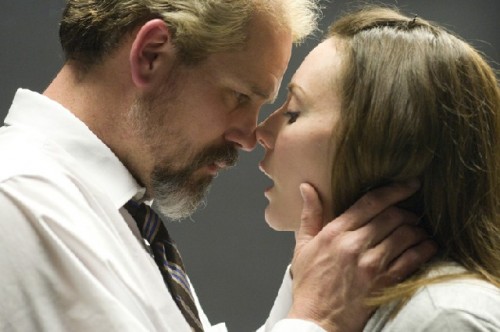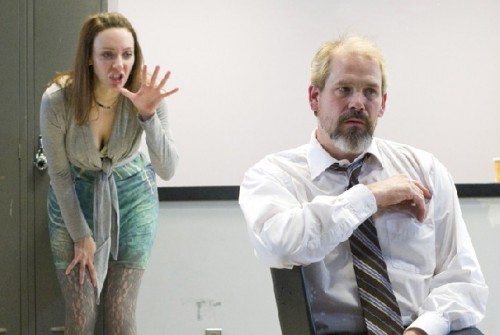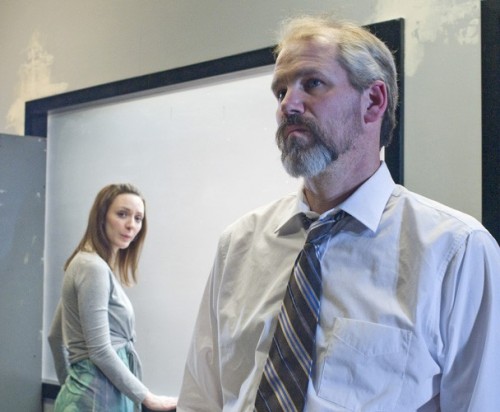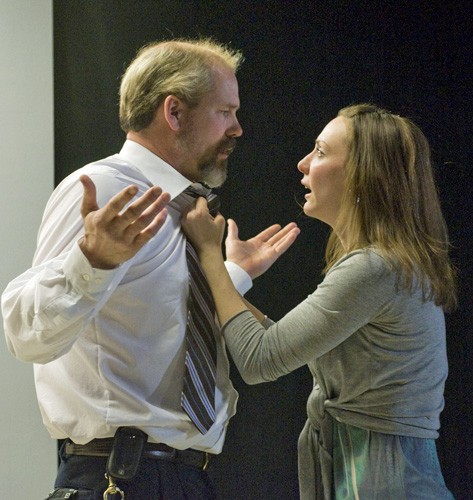Blackbird Roosts at Boston's SpeakEasy Stage Company
An Unsettling Exploration of Underage Sex, Secrets and Lies
By: Larry Murray - Mar 03, 2009
SpeakEasy Stage Company presents"Blackbird" by David Harrower
David R. Gammons, Director
Eric Levenson - Scenic Designer
Gail Astrid Buckley - Costume Design
Jeff Adelberg - Lighting Design
Cameron Willard - Sound Design
Cristine Lomaka - Producton Stage Manager
With Marianna Bassham as Una and
Bates Wider as Ray
At the Roberts Studio Theatre in the Stanford Calderwood Pavillion, Boston Center for the Arts, 527 Tremont Street, Boston. Through March 21. Tickets 617-933-8600.
http://www.speakeasystage.com
Blackbird is a topical, just ripped from the news kind of play. The only thing missing from the brilliant SpeakEasy Stage Company's production is a CNN-style bottom-of-the-screen device with crawling commentary. David Harrower's new play tackles the difficult subject of underage sex, and the devastating aftermath its two participants have endured. This foray into a taboo sexual relationship is its regional premiere. Its painfulness is initially softened though the passage of time but soon resurfaces. The reunion of the lovers takes place fifteen years after their original illicit affair. This production will play through March 21, and the performance reviewed here occurred halfway through the run.
The play won the 2007 Olivier Award (the British equivalent of the Tony) as best new play, and beat out such worthy contenders as Frost/Nixon, The Seafarer and Rock 'n Roll. The timeliness of the subject matter was likely a factor in its being selected. It strikes a special chord in Catholic Boston, where the specter of underage sexual abuse is still an open wound.
The premise of the play is simple. Ray had a love affair with a twelve year old girl some 15 years ago. He went to jail and served time for this crime. Una who was ultimately diagnosed with "adult sexual tendencies" wasn't entirely innocent. She left home to pursue this relationship. While it was a lustful sexual encounter, it is also arguably a search for love and meaning, innocence and guilt, all played out in an unforgiving world that disregards the emotional connections in such affairs and places the protagonists into pre-ordained boxes, meting out harsh retribution.
In this play we discover that it is the young girl who is the more punished of the two, her pain more from the scorn heaped on her by society and even her family because of the love she felt towards the older man. They refuse to allow her to own her own feelings. It is bad enough that innocence was lost, but unforgivable that she was forever branded a wanton child by those who should have protected her.
The playwright strives to make this more than simply a sensationalized story of guilt and punishment, but an in-depth exploration of the complexities of such a relationship. Through the playwright and players, we are forced to look unblinkingly beneath the surface. It is too easy to play pin-the-blame-on-the-older-man, and here we find that reality is far more complicated. And confusing. Ray stumbles and blurts, lies and obfuscates, and tries to make sense of his actions. So does Una.
With brief appearances by two other actors, the play is mostly a two-character psychodrama, with Bates Wilder brilliantly playing the confused and fumbling Ray while Marianna Bassham goes through every emotion in the book as the hurt and resentful Una.
Coming across his photo in a magazine, Una tracks Ray down at work - where he is living under an assumed name - and confronts him, many years after their initial encounter. Ray is stunned and stammering at her reappearance, and the relentless Una peppers him with questions and demands answers.
In this initial confrontation the two actors don't really have a conversation, but rather engage in a Beckett-like series of fragmentary sputterings as each tries to find their emotional footing. The dialog came across in stilted, halting and tumbling phrases. There are awkward pauses. False starts and non sequiturs. Unfortunately, this section is off-putting and not at all how real people behave. The playwright admits it is a bit of a personal conceit. Still, it did convey the initial sparring of two long-separated former lovers, though certainly not as effectively as it might have. A different reading of the passage might have also helped make more sense of it.
Blackbird is constructed like a patchwork, a series of brief interchanges about different aspects of the relationship with more twists and turns than a Berkshire mountain road. Some are very slippery. As the narrative proceeds, secrets reveal themselves, each time changing our opinion of the protagonists. While initially revealing, these intimate glimpses into their characters are also immediately suspect. Truth? Or lies? Echoes of Virginia Wolf!
Director David R. Gammons keeps the sparring pair moving like boxers in a trapezoidal ring throughout the 90 minute production. There is no intermission to allow either actors or audience to catch their breath and sort things out. The tension builds, as do the questions. Has Ray changed? Does Una want to reunite? The play summons up a final bizarre twist that leaves the audience gasping with amazement and surprise. We are left more puzzled than ever.
Curiously, what initially seem like minor imperfections in the plot soon became revealing tidbits. At first it was frustrating to watch the two at each others throats, there seemed to be little real synergy between them. This was evident mostly in Ray's lack of response to what Una said, and Una flying off the handle at almost everything Ray said. Una could say the most provocative things and Ray would barely blink. This lack of empathy starts to subtly change Ray from somewhat of a sympathetic victim of this tragedy to suspecting him of being a cold, calculating liar.
The play is about many things, but mostly it is a power struggle in which neither side can win. Ray in particular plays the typical male game of presenting reasons, arguments and rationales to justify his actions. When one doesn't work, he launches another. Una has problems too. She is desperate to turn her experience as a clueless pre-adolescent into someone who holds the power. Neither succeeds. Stalemate.
The idiosyncrasies of this play and its portrayals can be frustrating for the analytical mind. There is no linear logic. The answer is far more abstract. But part of the payoff is in letting the audience decide. Like a jury we must judge who is innocent and who is guilty. In the end, the total effect is more powerful than each of its parts. There is no simple right and wrong, neither black nor white. Instead, you leave the theatre thinking about the complexities of life, the limitations of trial and punishment, the difference between love and abuse.
The set and lighting combine to become almost a third character in this play. They are powerful elements. The concepts underlying the design are that of the director who has a degree in visual and environmental studies from Harvard. Eric Levenson built a simple room and hallway from real commercial office materials to create the playing environment. Jeff Adelberg installed the most glaring lighting element in the ceiling, a bank of harsh fluorescent lights that shine directly into the audience's eyes.
Under such light every twitch of the actors is revealed, with nothing hidden in shadows. Trash is strewn everywhere. We hear it crunch as the actors step on potato chip bags or kick soda cans out of the way. The harsh environment might be an interrogation room at Abu Ghraib. Is the accumulated trash a metaphor, a symbol? At one point Una empties the trash can over Ray, an odd moment that is almost a ritual cleansing.
There are subtle sound cues such as the air conditioning going on and off, and a slight buzz from the light fixtures to complete the effect of an oppressive environment. While an effective way to bring the audience into the atmosphere of the play, the set also had the odd effect of removing any warmth from the room, and with it most of the sympathy for the characters themselves.
While not an easy play to see, it is one that demonstrates theatre can still act as a "living newspaper," informing, entertaining and reporting on the human condition. Blackbird is a more than just a highly entertaining and riveting evening of theatre, it is a fascinating exploration of a troubling subject that is superbly acted and directed. It is the sort of play that will be talked about for a long time after it finishes its run.








